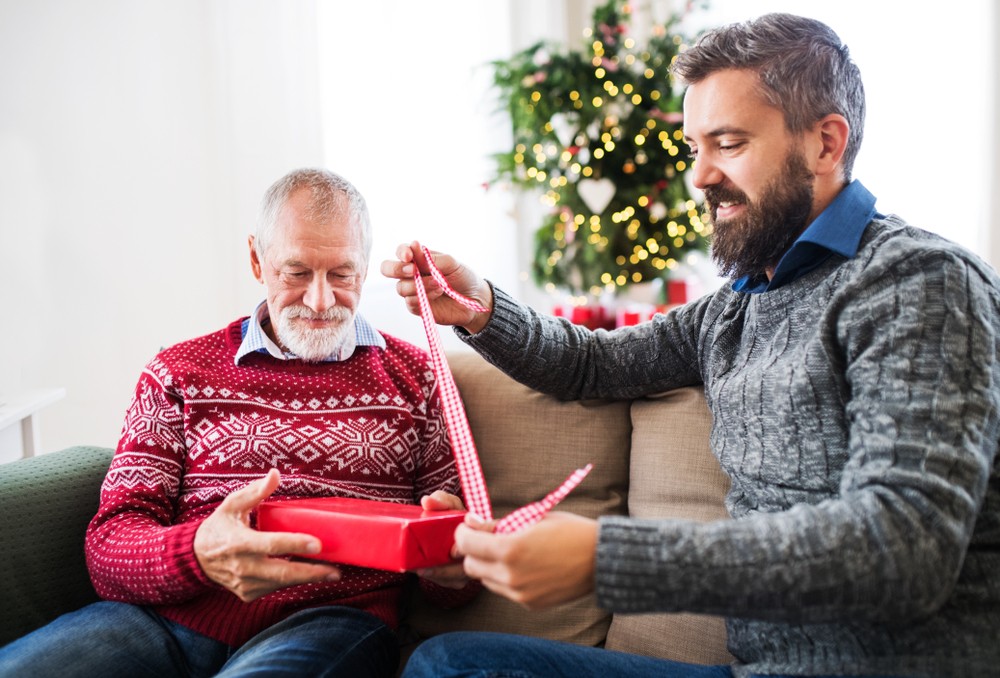Managing Memory Loss During the Holidays

As the holiday season approaches, you may be filled with pleasant anticipation. Cherished traditions, cheerful festivities and the opportunity to connect with family near and far make this a special time of year. But for someone with memory loss due to Alzheimer’s disease or other forms of dementia, the busyness and unpredictability of the holidays can be overwhelming. If you have a loved one who struggles with memory loss, here are some suggestions to help you adapt your festivities so that you both can enjoy a happy holiday season.
Create a Safe and Calm Atmosphere
People struggling with loss of memory tend to feel most comfortable in calm, predictable environments. To avoid situations that make your loved one feel overwhelmed or agitated, consider the following:
- Decorations. Avoid blinking lights, animatronic decorations and displays that alter the look of familiar rooms.
- Safety. Steer clear of decorations that could be mistaken for edible treats, such as artificial candies or faux fruits. And choose battery-operated candles to avoid open flames.
- Timing. Schedule events for the time of day when your loved one typically experiences the least confusion. As much as possible, try to keep to the usual routine for mealtimes and bedtime.
- Number of guests. A small, quiet and relaxed celebration will be less disorienting than a get-together with lots of people and competing conversations.
- A quiet corner. Reserve an area where your loved one can retreat to be alone or to enjoy a quiet, one-on-one conversation with a guest.
Tailor Holiday Activities to Your Loved One’s Needs
Your loved one may not be able to take on the same role as in holidays past, but there are ways you can include them in the season’s festivities. Whether you decorate cookies, enjoy favorite holiday tunes or make simple decorations, these ideas can be help you and other family members enjoy quality holiday time with your loved one:
- Choose activities they enjoy. Let your loved one’s preferences guide your choice of holiday activities. Even activities that aren’t holiday themed can be given a festive tone. For example, if your loved one enjoys jigsaw puzzles, choose one with a holiday motif and invite a few guests for a low-key puzzle party.
- Keep it simple. Your loved one’s attention span may make it difficult for them to enjoy complex or lengthy projects. Choose simple activities or encourage your loved one to help with a single step of a project, such as opening holiday mail or decorating cookies you’ve already baked.
- Focus on the process, not the outcome. Memory loss can make it difficult for someone to follow even simple directions or to recognize when they’ve made a mistake. To make sure neither you nor your loved one get frustrated, focus on the pleasure of spending time together rather than the finished product.
Help Visitors Set Realistic Expectations
If family and friends haven’t seen your loved one recently, it can be helpful to speak to them ahead of time so they know what to expect. Consider sharing the following:
- An update on your loved one’s health. Let visitors know about any changes in your loved one’s appearance and behavior. Describe symptoms so they know that lapses in memory or behavioral changes are a result of your loved one’s condition and shouldn’t be taken personally.
- Communication tips. Give some pointers about the most effective way to talk to someone with memory loss. Suggest that redirection and reassurance are more helpful than correction or criticism. And recommend topics of conversation that your loved one enjoys.
- The plan of events. Describe the activities you have planned and how you’ve tailored them to your loved one’s needs.
- How to adapt gift-giving. A large gift-exchange can be disorienting for someone with dementia. Let visitors know that it might be best to mail packages or drop them off to be opened in a quiet moment.
Take Care of Your Needs, Too
Self-care is important at any time of year, especially for caregivers whose responsibilities make them vulnerable to burnout. It’s even more important during the holidays, when there are additional demands on your time and energy. Here are some tips for taking care of yourself so the holidays are merry for you, too:
- Be realistic. You can’t do it all, so focus on the activities that are the most meaningful and enjoyable for you.
- Be honest. Let friends and family know if your caregiving duties will prevent you from contributing to family celebrations. Consider delegating tasks that typically fall on your shoulders.
- Schedule time for yourself. Ask a family member or friend to stay with your loved one so you can enjoy some holiday cheer without the responsibilities of caregiving.
Personalized Memory Care at Parkwood
At Parkwood, we take a personalized approach to memory care, getting to know residents so we can base their care on their individual preferences and abilities. Here, residents feel safe, purposeful and engaged, taking part in exercise, art and music programs in a comfortable, calm environment. If you’d like to learn more about the benefits of our person-centered approach to memory care, contact us. We’re happy to answer your questions or help you schedule a visit.




